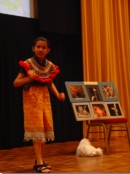Difference between revisions of "Folktales Storytelling Competition"
(→Event Management) |
|||
| (One intermediate revision by the same user not shown) | |||
| Line 1: | Line 1: | ||
__NOTOC__ | __NOTOC__ | ||
| − | The | + | The Folktales Storytelling Competition was an initiative of the National Library of Malaysia, state libraries and state public library corporations in Malaysia. The program was initiated in 2005 and implemented in 2006. The competition was open to children and young adults and it required the participants to present folklores of their choice for 15 minutes. A panel of judges would assign scores to the participants based on certain pre-determined criteria. The participant with the highest score would declared the champion. |
== Our Practice == | == Our Practice == | ||
| Line 192: | Line 192: | ||
== Follow Up == | == Follow Up == | ||
| − | The following year, the program was restructured and renamed | + | The following year, the program was restructured and renamed Folktales Storytelling Competition and Academy. |
Latest revision as of 09:14, 22 May 2019
The Folktales Storytelling Competition was an initiative of the National Library of Malaysia, state libraries and state public library corporations in Malaysia. The program was initiated in 2005 and implemented in 2006. The competition was open to children and young adults and it required the participants to present folklores of their choice for 15 minutes. A panel of judges would assign scores to the participants based on certain pre-determined criteria. The participant with the highest score would declared the champion.
Our Practice
In Sarawak the competition was held simultaneously in all the 11 Division on 5 May 2006. It was centrally coordinated by the Offsite Services Unit of the Information Services Division of Pustaka and facilitated by 11 event managers comprising mainly of senior officers of Pustaka. The local authorities played a vital role in facilitating in the implementation of the program. These local authorities were involved in the program were
|
a) Council of the City of Kuching South |
f) Kapit District Council |
On 13 May of the same year, the champions from all the 11 divisions competed at Pustaka capital to determine the state champion, who would then represent Sarawak at the national level bout. The Divisional Champions were
| Participant Names | School Names | Divisions | ||
| Liyana Amira Askan | Sekolah Kebangsaan Tabuan Ulu, Kuching | Kuching | ||
| Shannon Sebon | Sekolah Kebangsaan Abang Ain, Sri Aman | Sri Aman | ||
| Jennifer Tiong Yae Jen | Sekolah Jenis Kebangsaan (C) Sulai, Sibu | Sibu | ||
| Kevin Yapp Jun Hao | Sekolah Jenis Kebangsaan Chung Hua, Miri | Miri | ||
| Nur Farhana Yusop | Sekolah Kebangsaan Limbang | Limbang | ||
| Qurratu Aini Aniqah Sekaria | Sekolah Kebangsaan Methodist Anglo-Chinese | Sarikei | ||
| Fienbergson Wong Tiong Lik | Sekolah Kebangsaan Kapit | Kapit | ||
| Mac Han Agan | Sekolah Jenis Kebangsaan Chung Hua, Sebuyau | Samarahan | ||
| Ling Li Qian | Sekolah Jenis Kebangsaan Chung Hua, Bintulu | Bintulu | ||
| Zarina Zainuddin | Sekolah Kebangsaan Penakub Ulu | Mukah | ||
| Frevirra Pearl Francis Gundum | Sekolah Kebangsaan St. Augustine | Betong | ||
Event Management
Each panel of judges consisted of 1 officer from Pustaka and 2 officers from the local authorities. The judge responsibilities were to evaluate the performance of the participants based on the following criteria and assign scores.
| Criteria | Scores | |
| PRESENTATION TECHNIQUE Calm, confident, exciting and natural |
20 | |
| FEELING AND EMOTION Smooth storyline and fully engrossed |
20 | |
| LANGUAGE AND PRONUNCIATION Precise and clear pronunciation, application of intonation and creative usage of language |
20 | |
| EYE CONTACT ABD VOICE CONTROL Fully articulated eye movement with level of voice |
10 | |
| SUITABILITY OF THEME The theme is in tandem with local folklores and loaded with social values |
10 | |
| TIME CONTROL Ability to make full use of the time given |
10 | |
| CREATIVITY Creative use of attire. Usage of poems, poetries and folksongs |
10 | |
| Total | 100 | |
The judges would be giving scores independent of each other. The total scores given to a participant by the 3 judges would then averaged and aggregated to reach the final score. The participant with the highest score would be declared the winner.
Follow Up
The following year, the program was restructured and renamed Folktales Storytelling Competition and Academy.

